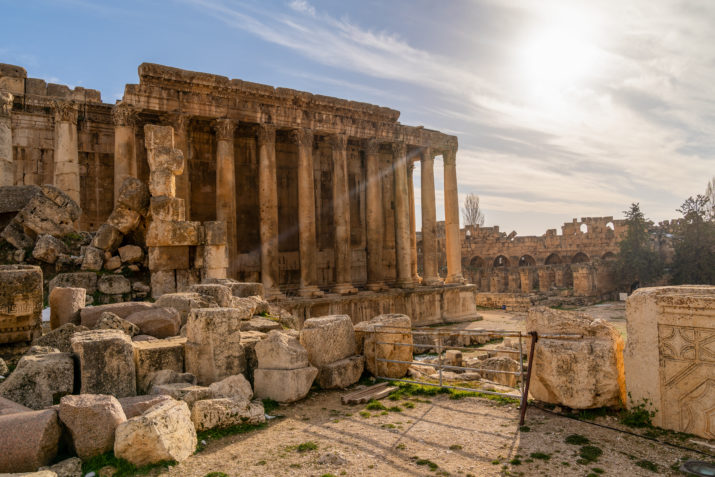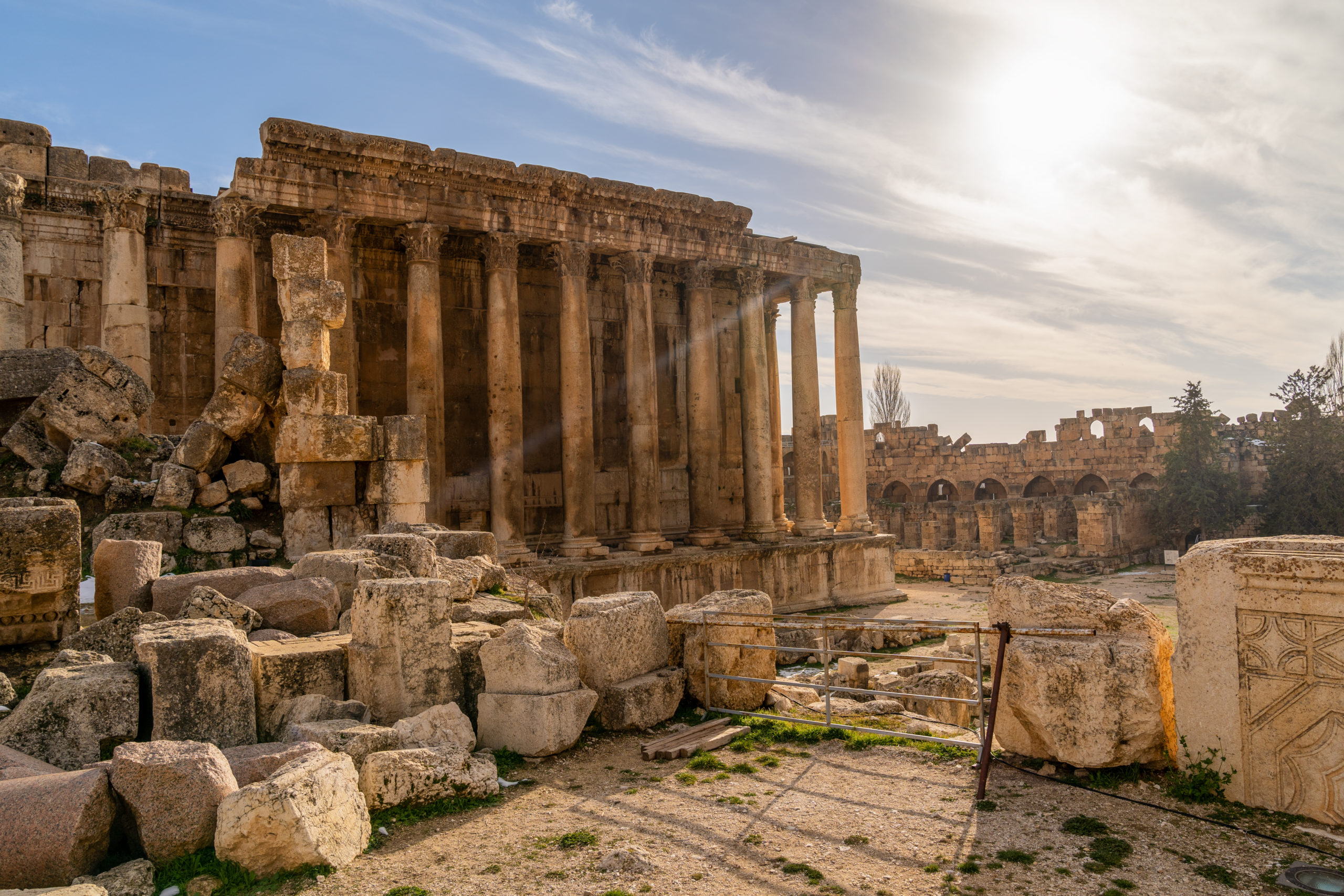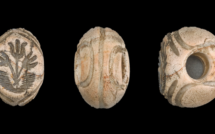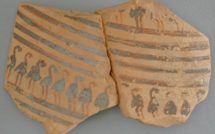
Interpretive Archaeology

This is part of our Campus Spotlight on Columbia University and the Université Paris 1, Panthéon-Sorbonne.
As part of the Alliance program commitment to develop online learning and research activities across the Atlantic, this graduate seminar will be offered to both Columbia and Paris 1 Panthéon-Sorbonne students as a joint online course that will encourage student interaction through shared assignments. The seminar will be held in English.
The objective of this graduate seminar is to bring a historiographical dimension to the training of archaeology students, by providing them with the keys to various readings of ancient Greek societies and their material culture and the way these have been constantly renewed since the nineteenth century. Through class presentations of both classical and recent texts, the seminar will develop ways of better identifying the interpretive models—most often implicit in the practice of archaeologists—which have shaped classical scholarship up to now. The seminar will offer the opportunity to discuss these models, be they supplementary or conflicting, in order to move towards an ever more explicit reasoning on archaeological interpretations of the past.
Course description
As post-processual archaeologist Ian Hodder once argued, interpretations of past material cultures and societies rest partially on social and cultural contexts in the present. They depend on the cultural background of scholars, on their education and responses to current issues, but also on their academic influences. In this sense, archaeology might be considered as a social practice which is concerned with meanings and making sense of things. Beyond this approach to archaeology which stems from post-processual thinking—and risks leading to absolute relativism—this graduate seminar mostly emphasizes the value of historiography, that is of how scholars have studied a particular subject using specific sources, techniques and theoretical approaches. As background models applied to the interpretation of material culture are not always explicitly referred to in the writings of archaeologists—nor even sometimes consciously integrated and applied—historiography has become a specific field of research, worthy of consideration when reading other scholars’ works and evaluating them critically in relation to one’s own beliefs—which have also to be made explicit and fully scrutinized.
Interpretive models applied by classical archaeologists to material culture have fluctuated greatly since the late nineteenth century. Models often reflect contemporary debates in classical historiography, implying more general ideas on social structure, economy, politics, etc., which sometimes also correspond to national trends. A very clear example of this is the debate on the nature of the Greek polis. According to the British historian Oswyn Murray (1990), “To the Germans the polis can only be described in a handbook of constitutional law; the French polis is a form of Holy Communion; the English polis is a historical accident; while the American polis combines the practices of a Mafia convention with the principles of justice and individual freedom”. Taking Murray’s description as a fil rouge, the seminar will explore how past and current models have shaped the discourse on the Greek city and its material culture. The Transatlantic tone of the seminar will also be an opportunity to focus on specific French or Anglo Saxon approaches, their similarities and discrepancies. Three main topics will be addressed through dedicated reading lists, class presentations and group discussions: (a) Aristocracy and elites; (b) Citizenship; (c) Ethnicity and hybridity. These three topics may be further described as follows:
- Aristocracy and elites: Throughout the twentieth century, archaic elites have been considered as ‘aristocrats’ who ruled by hereditary right and enjoyed a life of leisure thanks to their riches. It was supposed that their leading position in society was jealously guarded by means of a gentilician social structure, until the lower social ranks, the dēmos, challenged their right to control every political office and the whole process of decision-making. In relation to material culture, any outstanding tomb or statue was attributed to the deeds of these ‘aristocrats’, as a self-explaining phenomenon. Over the past decades, however, various studies have deeply challenged this definition of ‘aristocracy’ by rethinking its relationship to political authority, nobility and wealth. In all these aspects, ‘aristocrats’ actually seem to have held an unstable position, which had to be constantly built up, so that social status is understood now to have been achieved rather than ascribed in archaic and classical Greece. Individual status was the result of continuous investment in forms of behavior requiring a great deal of time, money and energy. This reconsideration of the definition of the archaic elites has led to a new, more active, approach to material culture.
- Citizenship: Citizenship is a major feature of contemporary national and international politics. It is also a legacy of ancient Greece. The concept of membership of a community appeared in Greece some three millennia ago as a participation in the social and political life of small-scale communities, but it is only towards the end of the fourth century bc that Aristotle offered the first explicit statement concerning it. Although widely accepted by historians and archaeologists, the Aristotelian definition remains deeply rooted in the philosophical and political thought of the classical period, and probably fails to account accurately for the previous centuries and the dynamics of the emergent cities. Focusing on archaic Greece, we will explore various pathways to archaic citizenship as they have been studied over the past century, including archaeological approaches to citizenship.
- Ethnicity and hybridity: Since at least the late nineteenth century, the temptation to assimilate particular material cultures or styles with specific peoples or ‘races’ has been a commonplace in the history of archaeological thought. Matters of ethnicity were often treated as biological facts and taken as obvious explanations of variations in material culture. For example, applying a straightforward reading of ancient texts and a culture-historical approach to archaeology—the so-called Kulturkreise method—, archaeologists have long subscribed to the idea of a migration of Dorian people in early Greece, corresponding to what Martin Bernal once called the “Aryan model.” Beyond the so-called Black Athena controversy, ethnicity has been turned more recently into a discursive construction of identity, elaborated on myths of common origin and ancestry, while specific changes in material culture have been explored through the lens of hybridization.
Course organization
As a transatlantic online course, this new kind of seminar requires a specific organization. The seminar will be held on Zoom. Attendance and active participation are mandatory. The calendar and schedule of the seminar will take into consideration the time difference, as well as slight discordances in the length of the spring semester, to accommodate the constraints of both Columbia and Paris 1.
Although the seminar will be offered to both Columbia and Paris students, teaching, class presentations and class discussions will be exclusively in English. Since Paris students may not be fully fluent in English, some discussions or comments may be initiated in French, to foster participation of French-speaking students, but the discussion will then follow in English. No proficiency in French is required from Columbia students. Assignments and class presentations will be in English.
This graduate seminar will rest on active participation by students. After a three-week introduction, students will engage in class presentations of shared assignments. Individual class presentations will be based on teamwork within Transatlantic groups made of 2 to 3 students from each university. International collaborative work is mandatory, implying email exchanges and/or Zoom meetings between New York and Paris students prior to class presentation.
Course material
Most texts required for the preparation of this class will be available as electronic texts via the Moodle platform of the Université Paris 1 Panthéon-Sorbonne (https://cours.univ-paris1.fr/course/view.php?id=19022). Specific credentials will be provided to Columbia students to access the platform in the same conditions as Paris students (access key: Alliance). The platform is accessible in English. Students may also be asked to consult books at Columbia University’s libraries.
Group I: Aristocracy and elite
- Jean-Pierre Vernant, “La lutte des classes”, Eirene 4 (1965), p. 5-19, reprinted in Mythe et Société en Grèce ancienne, Paris, 1974, p. 11-29; English translation: “The Class Struggle”, in Myth and Society in Ancient Greece, New York, 1990, p. 11-27.
- Walter Donlan, The Aristocratic Ideal in Ancient Greece. Attitudes of Superiority from Homer to the End of the Fifth Century B.C., Lawrence, 1980 (5 first chapters).
- E.M. de Ste. Croix, The Class Struggle in the Ancient Greek World. From the Archaic Age to the Arab Conquests, Ithaka, 1981, p. 3-30.
- Josiah Ober, Mass and Elite in Democratic Athens. Rhetoric, Ideology, and the Power of the People, Princeton, 1989, chap. 2 (p. 53-103).
- Alain Duplouy, Le prestige des élites. Recherches sur les modes de reconnaissance sociale en Grèce entre les Xe et Ve siècles avant J.-C., Paris, 2006, introduction (p. 11-35).
- Alain Duplouy, “La cité et ses élites. Modes de reconnaissance sociale et mentalité agonistique en Grèce archaïque et classique”, in H. Fernoux and C. Stein (eds), Aristocratie antique : modèle et exemplarité sociale, Dijon, 2007, p. 57-77.
- Hans van Wees and Nick Fisher, “The Trouble with ‘Aristocracy’”, in N. Fisher and H. van Wees (eds), ‘Aristocracy’ in Antiquity. Redefining Greek and Roman Elites, Swansea, 2015, p. 1-57.
Group II: Citizenship
- Claude Mossé, “La conception du citoyen dans la Politique d’Aristote’, Eirene 6 (1967), p. 17-21 or C. Johnson, ‘Who is Aristotle’s citizen ?”, Phronesis 29 (1984), p. 73-90.
- Ian Morris, Burial and Ancient Society. The Rise of the Greek City-State, Cambridge, 1987, part. 3 (p. 171-217).
- Philip B. Manville, The Origins of Citizenship in Ancient Athens, Princeton, 1990, chap. 1 (p. 3-34).
- Virginia Hunter, “Introduction: status distinctions in Athenian law”, in V. Hunter and J. Edmonson (eds), Law and Social Status in Classical Athens, Oxford, 2000, p. 1-29.
- Françoise Ruzé, « Les premières manifestations de la citoyenneté en Grèce », in À la recherche de l’équité, Paris, 2003, p. 165-174.
- Alain Duplouy, “Pathways to Archaic Citizenship”, in A. Duplouy and R.W. Brock (eds), Defining Citizenship in Archaic Greece, Oxford, 2018, p. 1-49.
- Alain Duplouy, “Citizenship as Performance”, in A. Duplouy and R.W. Brock (eds), Defining Citizenship in Archaic Greece, Oxford, 2018, p. 249-274.
Group III: Ethnicity and hybridity
- Martin Bernal, Black Athena: The Afroasiatic Roots of Classical Civilization. Volume I: The Fabrication of Ancient Greece, 1785-1985, New Brunswick, 1987, p. 1-74; French translation: Black Athena. Les racines afro-asiatiques de la civilisation classique. I. L’invention de la Grèce antique 1785-1985, Paris, 1996, p. 23-97.
- Molly Myerowitz Levine, “The use and abuse of Black Athena”, The American Historical Review 97 (1992), p. 440-460.
- Alexandre Massé, « Le génie des ‘races’ helléniques : Ioniens et Doriens dans La Grèce moderne d’Edgar Quinet », Revue de la MRSH de Caen, 2007. https://hal.archives-ouvertes.fr/hal-00324391
- Jonathan Hall, Ethnic Identity in Greek Antiquity, Cambridge, 1997, p. 1-66 (chap. 1, 2 & 3)
- Peter van Dommelen, “Ambiguous matters: Colonialism and local identities in Punic Sardinia”, in C.L. Lyons and J.K. Papadopoulos (eds), The Archaeology of Colonialism, Los Angeles, 2002, p. 121-147.
- Ian Morris, “Mediterraneanization”, Mediterranean Historical Review 18 (2003), p. 30-55
- Irad Malkin, “Hybridity and mixture”, in Ibridazione e integrazione in Magna Grecia. Forme. Modelli. Dinamiche. AttiTaranto 54 (2014), Taranto, 2017, p. 11-27.
Course schedule
Week 1:
Introduction
Week 2:
Historiography of the Greek city – Part I
- Oswyn Murray, “Cities of Reason”, in O. Murray and S. Price (eds), The Greek City from Homer to Alexander, Oxford, 1990, p. 1-25.
- Mogens H. Hansen, Polis and City-State: An Ancient Concept and its Modern Equivalent, Copenhagen, 1998.
Week 3:
Historiography of the Greek city – Part II
- Vincent Azoulay and Paulin Ismard, “Les lieux du politique dans l’Athènes classique. Entre structures institutionnelles, idéologies civique et pratiques sociales”, in P. Schmitt-Pantel and F. de Polignac (eds), Athènes et le politique. Dans le sillage de Claude Mossé, Paris, 2007, p. 271-309.
- Kostas Vlassopoulos, Unthinking the Greek Polis: Ancient Greek History beyond Eurocentrism, Cambridge, 2007.
Week 4:
Student presentations and class discussion – Group I: Aristocracy and elite – Part I
Week 5:
Student presentations and class discussion – Group I: Aristocracy and elite – Part II
Week 6:
Student presentations and class discussion – Group I: Aristocracy and elite – Part III
Week 7:
Paris Spring Break / Debriefing with Columbia students
Week 8:
Columbia Spring Break / Debriefing with Paris students
Week 9:
Student presentations and class discussion – Group II: Citizenship – Part I
Week 10:
Student presentations and class discussion – Group II: Citizenship – Part II
Week 11:
Student presentations and class discussion – Group II: Citizenship – Part III
Week 12:
Student presentations and class discussion – Group III: Ethnicity and hybridity – Part I
Week 13:
Student presentations and class discussion – Group III: Ethnicity and hybridity – Part II
Week 14:
Student presentations and class discussion – Group III: Ethnicity and hybridity – Part III
Week 15:
Papers due
Alain Duplouy is Reader in Greek archaeology at the Université Paris 1, Panthéon-Sorbonne. A former Dean of the Faculty of Art history and archaeology, he was the Chancellor’s delegate for the university real estate and cultural heritage until the end of 2020. He has led archaeological fieldwork programs in Greece (Itanos) and Italy (Laos and Pietragalla) and has published extensively on elites and citizenship in archaic Greece.
Photo: The historical city of Baalbek, In Greek and Roman times Baalbek was also known as Heliopolis | Shutterstock
Published on May 11, 2021.




